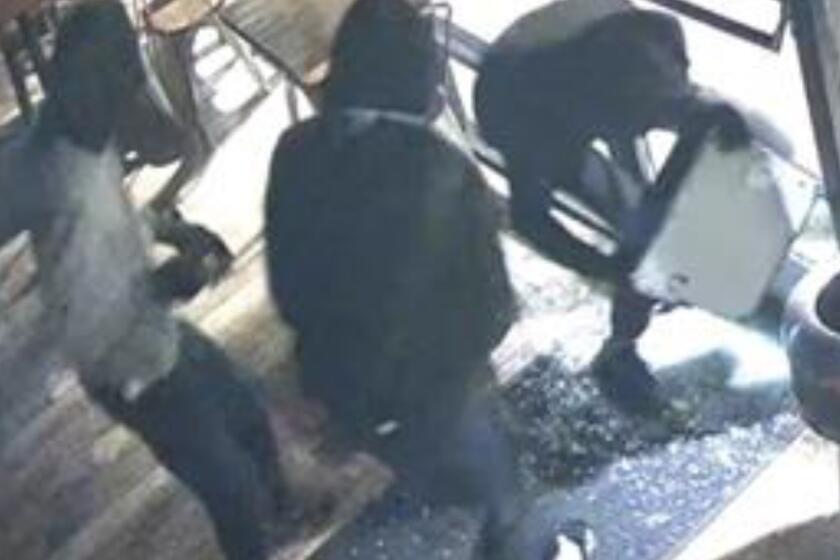Berkeley’s inaction on bones criticized
State Senate leaders chastised UC Berkeley administrators Tuesday for trampling on the civil rights of Native Americans by not returning the remains of thousands of their ancestors held in storage at a campus museum.
Sen. Darrell Steinberg (D-Sacramento), the incoming Senate leader, accused the university of discriminating against Native Americans by keeping the bones and artifacts at the Phoebe A. Hearst Museum of Anthropology despite federal and state laws that established procedures for returning them years ago.
“If there were remains of my ancestors, European Americans, in the Hearst museum at one of the most respected universities in the country, there would be an absolute outcry from people, and I guarantee you something would be done about it quickly,” Steinberg told university officials at a hearing of the Senate Governmental Organization Committee. “But because they’re Native American remains, somehow it is different.”
For more than 40 years, the bones of about 12,000 Native Americans have been kept in drawers and cabinets under the swimming pool of the Hearst Gymnasium, next door to the museum. Most of the bones were dug up by university archaeologists in the first half of the 20th century.
Under the 1990 federal Native American Graves Protection and Repatriation Act and a similar 2001 state law written by Steinberg, the museum is required to identify the origins of bones and artifacts in its collection and return them to the tribes they came from. So far the museum has repatriated the bones of about 260 individuals.
UC Berkeley triggered new controversy over the bones in June when it eliminated the staff unit within the museum that was responsible for working with tribes and facilitating the return of the remains.
University administrators say they disbanded the unit because it was “dysfunctional” and that its role had been incorporated into the duties of the entire staff. But some tribal leaders and former unit members contend it was eliminated because it was working too closely with tribes.
“I think it is bald-faced racism at the museum,” testified Otis Parrish, a Kashia Pomo who served as the Hearst’s cultural attache and left when the unit was eliminated. “We were lied to and treated with contempt and disrespect.”
Testifying for the university was Vice Chancellor Beth Burnside, who oversaw the museum reorganization. She was questioned by committee members about a memo she wrote urging a subordinate to “stonewall” the museum’s Native American critics.
The museum based its decision to eliminate the unit on a review by two archaeologists from UC Davis and UC Santa Barbara. Before the review began, interim unit Director Larri Fredericks urged UC administrators to include a Native American on the panel or some tribes would be upset.
That prompted an e-mail from Burnside to Robert Price, the associate vice chancellor for research: “Maybe better to stonewall altogether but I see blackmail here that she’s threatening to stir them up. . . . We should definitely not go there.”
After writing the e-mail, Burnside inadvertently sent it to Fredericks. Under questioning from Sen. Dean Florez (D-Shafter), the committee chairman, Burnside acknowledged writing the message but defended herself, saying that she had “intended the e-mail as constructive advice.”
Some people have “misinterpreted” the e-mail as insensitive, she said, but added, “I meant no disrespect for the Native American community.”
Florez also questioned why top university officials had been unwilling to work directly with tribes angered by the reorganization. Noting that Chancellor Robert Birgeneau had refused to meet with tribal leaders, Florez urged the chancellor to meet with them now or face appearing before the Senate committee.
After the hearing, Florez said he believed the testimony from Burnside and acting museum Director Judson King indicated that university officials did not understand the importance of showing respect to the tribes. “It just shows their arrogance,” he said. “Their view is: We really don’t have to sit down and resolve this. We own these bones. We will make it as difficult for the tribes to get them as possible.”
Steinberg, who is not a committee member but participated in the hearing, said that some university academics opposed the return of the remains because the loss of the collection would reduce the university’s standing.
“The real reason why there was not a more aggressive posture by the university to repatriate is because there is a whole lot of pressure from the academic side,” he said. “They don’t want all these remains or artifacts returned because that would impugn, in their view, the research capability of the university.”
--
More to Read
Start your day right
Sign up for Essential California for news, features and recommendations from the L.A. Times and beyond in your inbox six days a week.
You may occasionally receive promotional content from the Los Angeles Times.






